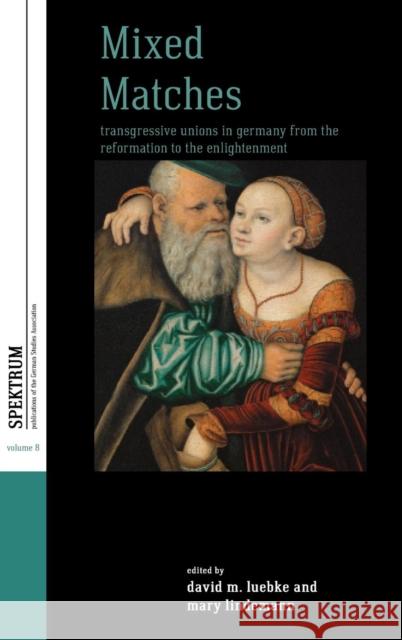Mixed Matches: Transgressive Unions in Germany from the Reformation to the Enlightment » książka
Mixed Matches: Transgressive Unions in Germany from the Reformation to the Enlightment
ISBN-13: 9781782384090 / Angielski / Twarda / 2014 / 284 str.
"The essays in this groundbreaking volume explore discourses and practices surrounding a wide variety of transgressive unions in early modern Germany, including those that challenged boundaries of confession, rank, race, honor, sexual morality (e.g., the incest 'taboo'), and, in the case of bigamy, the institution of marriage itself. Taken together, they provide fascinating new insight into the shifting understandings of marriage and sexual union in the years 1500-1800 while highlighting the public dimensions of private intimacy throughout this era." - George Williamson, Florida State University "This collection of essays implicitly addresses the adage that 'every rule is made to be broken.' Each author takes up a category of departure-shall I say deviance?-from the norms governing moral behavior in early modern Germany, an age allegedly rigidly devoted to order and discipline. The topics run from bigamy through ex-nuns' marriage, marital class and racial differences, spousal adherence to opposing faiths, and incest. These studies all embody significant primary research and are of uniformly high quality. Collectively they illuminate not only specific acts of nonconformity but the standards themselves." - Susan C. Karant-Nunn, University of Arizona The significant changes in early modern German marriage practices included many unions that violated some taboo. That taboo could be theological and involve the marriage of monks and nuns, or refer to social misalliances as when commoners and princes (or princesses) wed. Equally transgressive were unions that crossed religious boundaries, such as marriages between Catholics and Protestants, those that violated ethnic or racial barriers, and those that broke kin-related rules. Taking as a point of departure Martin Luther's redefinition of marriage, the contributors to this volume spin out the multiple ways that the Reformers' attempts to simplify and clarify marriage affected education, philosophy, literature, high politics, diplomacy, and law. Ranging from the Reformation, through the ages of confessionalization, to the Enlightenment, Mixed Matches addresses the historical complexity of the socio-cultural institution of marriage. David M. Luebke is Professor of History at the University of Oregon. He is author of His Majesty's Rebels: Communities, Factions and Rural Revolt in the Black Forest, 1725-1745 (1997), editor of The Counter-Reformation (1999), and co-editor of Conversion and the Politics of Religion in Early Modern Germany (2012). He is completing a book on multiconfessional cohabitation in northwestern Germany during the sixteenth and seventeenth centuries, tentatively titled Hometown Religion: Conflict and Consensus among the Christian Religions of Germany, 1553-1650. Mary Lindemann is Professor and Chair of the Department of History at the University of Miami in Coral Gables, Florida. She is the author of four books: Liaisons dangereuses: Sex, Law, and Diplomacy in the Age of Frederick the Great (2006); Medicine and Society in Early Modern Europe (1999; 2nd ed., 2010); Health and Healing in Eighteenth-Century Germany (1996); and Patriots and Paupers: Hamburg, 1712-1830 (1990). She has recently completed a book-length manuscript entitled The Merchant Republics: Amsterdam, Antwerp, and Hamburg, 1648-1790.
"The essays in this groundbreaking volume explore discourses and practices surrounding a wide variety of transgressive unions in early modern Germany, including those that challenged boundaries of confession, rank, race, honor, sexual morality (e.g., the incest taboo), and, in the case of bigamy, the institution of marriage itself. Taken together, they provide fascinating new insight into the shifting understandings of marriage and sexual union in the years 1500-1800 while highlighting the public dimensions of private intimacy throughout this era." · George Williamson, Florida State University"This collection of essays implicitly addresses the adage that every rule is made to be broken. Each author takes up a category of departure-shall I say deviance?-from the norms governing moral behavior in early modern Germany, an age allegedly rigidly devoted to order and discipline. The topics run from bigamy through ex-nuns marriage, marital class and racial differences, spousal adherence to opposing faiths, and incest. These studies all embody significant primary research and are of uniformly high quality. Collectively they illuminate not only specific acts of nonconformity but the standards themselves." · Susan C. Karant-Nunn, University of ArizonaThe significant changes in early modern German marriage practices included many unions that violated some taboo. That taboo could be theological and involve the marriage of monks and nuns, or refer to social misalliances as when commoners and princes (or princesses) wed. Equally transgressive were unions that crossed religious boundaries, such as marriages between Catholics and Protestants, those that violated ethnic or racial barriers, and those that broke kin-related rules. Taking as a point of departure Martin Luthers redefinition of marriage, the contributors to this volume spin out the multiple ways that the Reformers attempts to simplify and clarify marriage affected education, philosophy, literature, high politics, diplomacy, and law. Ranging from the Reformation, through the ages of confessionalization, to the Enlightenment, Mixed Matches addresses the historical complexity of the socio-cultural institution of marriage.David M. Luebke is Professor of History at the University of Oregon. He is author of His Majestys Rebels: Communities, Factions and Rural Revolt in the Black Forest, 1725-1745 (1997), editor of The Counter-Reformation (1999), and co-editor of Conversion and the Politics of Religion in Early Modern Germany (2012). He is completing a book on multiconfessional cohabitation in northwestern Germany during the sixteenth and seventeenth centuries, tentatively titled Hometown Religion: Conflict and Consensus among the Christian Religions of Germany, 1553-1650.Mary Lindemann is Professor and Chair of the Department of History at the University of Miami in Coral Gables, Florida. She is the author of four books: Liaisons dangereuses: Sex, Law, and Diplomacy in the Age of Frederick the Great (2006); Medicine and Society in Early Modern Europe (1999; 2nd ed., 2010); Health and Healing in Eighteenth-Century Germany (1996); and Patriots and Paupers: Hamburg, 1712-1830 (1990). She has recently completed a book-length manuscript entitled The Merchant Republics: Amsterdam, Antwerp, and Hamburg, 1648-1790.











